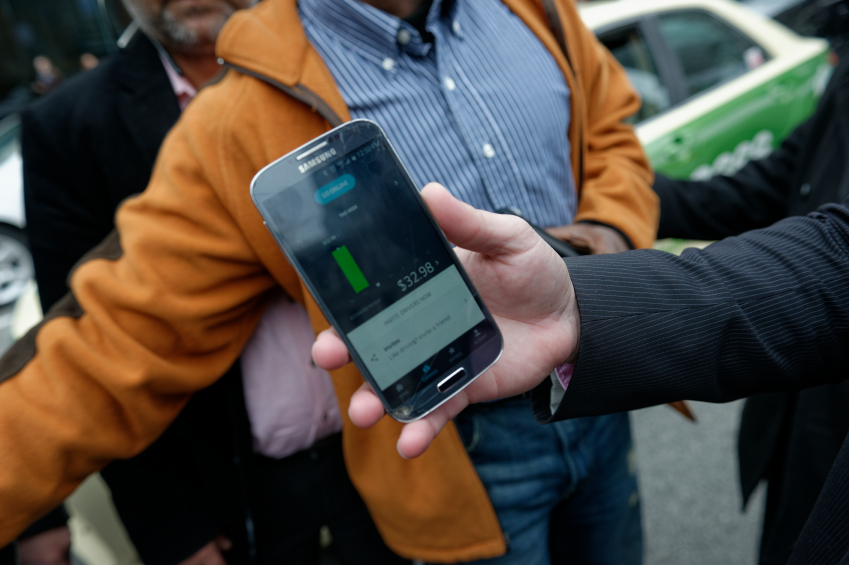
Philadelphia, PA, USA – December 16, 2015; During a Center City Philadelphia protest of cab and limousine drivers one of the participating protesters holds up his smart phone showing his earnings statement of the past days he received from the Uber app. T
Uber will most likely discontinue service in Corpus Christi if a new Transportation Network Company ordinance passes on its second reading before the city council March 8. Modeled on a similar ordinance in Houston, the proposed regulations lighten the burden of licensing and fees for TNC drivers but not enough to satisfy Uber.
“Uber complied with the same regulations in Houston,” city attorney Miles Risley said. “Whether they do it here or not is a business decision they have to make.”
A spokesperson for Uber explained to Corpus Christi Business News that the company reluctantly decided to stay in Houston because of its size, the demand for drivers and the number of drivers willing to work, despite added fees and regulations. As a much smaller market, Corpus Christi will be checked off the list of Uber cities, just as Galveston was when it passed the same ordinance last year.
"The regulations considered today reveal a fundamental misunderstanding of the ride-sharing industry,” said the Uber spokesperson, who asked not to be named in compliance with company policy.
She explained that ride-sharing drivers use their own vehicles to make extra money. The majority drive fewer than 10 hours a week, and 69 percent have full-time or part-time jobs outside of Uber.
Uber operates in more than 200 cities in the United States that rely on safety systems similar to those recently adopted in Beaumont, San Marcos and College Station.
Called driver-partners, each Uber driver is screened before he or she is allowed to access the platform and be assigned rides. This includes both criminal background and driving history checks. Drivers must provide licensing and vehicle documentation. The company also has a zero tolerance policy for bad behavior, the spokesperson said. Complaints are immediately acted upon, and drivers are removed from the platform.
Riders are also protected by the Uber app itself, which tracks exactly where the person is along the route. The way it works is riders use the app to request a ride. They are sent a photo of the driver and car along with the license plate number. With the touch of a button, riders can allow family or friends to track their route and receive notification that they have safely arrived.
After each trip, riders and drivers rate the experience. Drivers who receive bad ratings are no longer assigned rides. Passengers with bad ratings can be denied service. An incident response team immediately addresses any issues that come up, according to a written policy statement from the company.
“Uber's platform is built on technology that makes it possible to focus on safety for riders and drivers before, during and after every trip in ways that haven't been possible before,” the spokesperson said.
The city and Uber disagree on several points. Uber does not want its drivers to meet the same requirements as a taxi driver. Taxi companies must have a physical place of business in the city. They pay a licensing fee of $2,500 each and an airport fee of $2 per ride. Trade emblems are required on the sides and back of the vehicle with the company’s name and phone number in lettering at least 2½ inches high. Maximum age of any vehicle used is 10 years. Taxis must have meters that prominently show the cost of the ride.
The new ordinance does not require Uber to have a physical presence in the city. Instead of the $2,500 license, drivers would be required to pay 2 percent of fees collected. No airport fees would be required of TNC drivers. They would have to have signs on the side of their cars that can be read within 50 feet of the vehicle. Uber drivers are not required to have a meter as Uber fees are tracked by phone apps.
The Uber spokesperson said the company has worked with dozens of other cities and states across the U.S. and hopes Corpus Christi will work with them as well.
“We urge the city of Corpus Christi to follow the lead of dozens of other cities and states and embrace modern regulations that preserve people's ability to earn money and request a ride at the tap of a button,” she said.
City attorney Risley said he was not aware of any negotiations between the city and Uber to make changes to the ordinance. It was approved by the council in a first read Feb. 23.
“As a general policy matter, we encourage all lawful businesses to operate in the city in accordance with the law," Risley said. "This ordinance does lighten the regulatory regime for TNCs. It makes it much more efficient to accommodate a part-time driver.”
Currently, Uber drivers operating in the city are doing so illegally, Risley said. Violators can be fined up to $500 for each violation.





